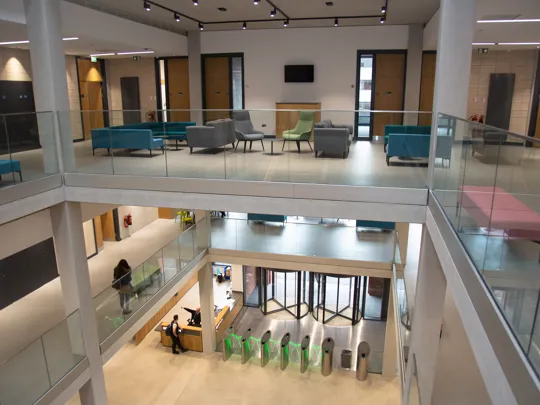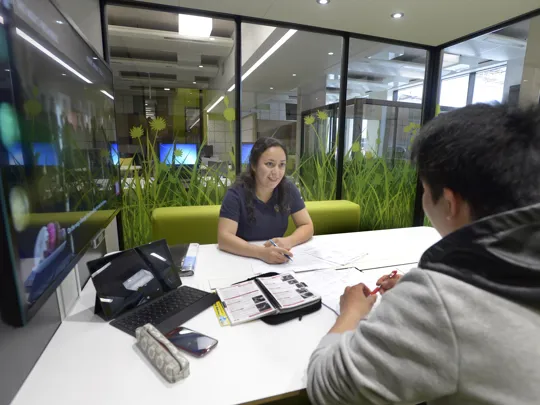Why should I choose this course?
- RESIDENTIAL VISIT – Study the role of events in tourism development on a visit to a global destination*, with essential fees covered by the University – past trips have included Milan, New York, Copenhagen, Athens and Vienna (* subject to visa requirements)
- ENRICHMENT – Hear from guest speakers and visit a wide array of major events and venues including ICC Birmingham, Telford International Conference Centre and International Confex in London
- PRACTICAL APPLICATION – Work on live current case studies and develop further skills using Cvent event management software, with additional certification to boost your CV
- NO EXAMS - If you are not keen on exams, this course is for you. Unlike many degrees in this field, you will have no written exams during or at the end of the course and will be assessed through practical assessments and coursework only
- AWARD-WINNING UNIVERSITY – Study at the highest-ranking university in the region according to student choice (Whatuni Student Choice Awards 2023)
Our facilities
Our learning spaces at University College Birmingham ensure you have the right environments to build your knowledge, from lecture theatres to interactive group working spaces and extensive library resources.
Course breakdown
- Postgraduate
Core Modules
Events in Tourism Development
Events are seen as key drivers of tourism development. Events help initial development and attract investment, aid co-branding and enhanced destination's reputation, encourage business development and improvement, incentive travel/experiential events and lead to the enhanced sustainability of the tourism destination. Students will critically analyse both the positive and negative impacts events can bring to a destination. Throughout the module students will explore issues surrounding event tourism provision using data analysis, strategic thinking, commercial awareness and fieldwork research. This module involves an international residential trip abroad where students carry out their fieldwork research with the opportunity to explore tourism and event issues in an exciting overseas destination. This module helps to build the following employability skills such as high-level analysis, research and enquiry; analytical skills, time management, organisational skills and business acumen, communication and research skills.
Global Digital Marketing
The learning philosophy underpinning this module aims to encourage the development of the analytical, evaluative, creative and critical patterns of thought needed to understand, develop, operate and implement successful strategic digital marketing plans, vital for the modern marketing workplace. Thus enabling the student to develop both the practical and theoretical skills to work within a dynamic digital marketing environment.It will enable the student to take a strategic approach to digital marketing planning, integrating digital strategy, models, frameworks, the use of events to launch brands and reactivation campaign s, PR and techniques throughout to achieve competitive advantage. It recognises the significance of situation analysis and introduces the student to both traditional evaluative techniques and new digital platforms for assessing both the macro and micro environments that enables effective decision making. The module will also outline the importance of all stages within the digital marketing planning process, from the digital audit, through to strategic decision making, to implementation of plans. Finally, students will learn how to manage resources and employ monitoring and measurement techniques that enable the achievement of strategic marketing objectives.Through studying this Level 7 module, students will develop and enhance their employability skills including high level analysis, research and enquiry; ability to problem-solve; digital marketing software proficiency; business acumen; project management skills; financial analysis; and communication skills.
International Events Management
You will critically assess the feasibility of large-scale event projects and facilities. By examining contemporary issues and trends, you will understand the impact of international events on local and regional economies. You will evaluate the financial viability of event projects, the international workforce, return on investment and critically analyse operational requirements that may influence key performance indicators.
Sustainability and Ethics in Events
Students will develop a deep understanding of sustainability and ethics in event organisations and understand the challenges facing the global events industry. You will examine the principles of ethical and responsible behaviour of global event operations in meeting their environmental, social and economic obligations and how they work towards making events more efficient and effective. This module seeks to increase employability skills by developing high-level analysis, research and enquiry; developing problem solving, self-reliance and confidence, business acumen, and research skills.
Choose 1 optional module
Postgraduate Conference Research Project
The Postgraduate Conference Research Project allows students to engage in creative enquiry as they demonstrate ability to develop an in-depth investigation into an area of their own interest within the area of Hospitality, Tourism or Events management. The Module develops business relevant knowledge and advantageous competencies such as report writing, visual communication and presentation skills.
Postgraduate Employability Project
This project is formed while working on your industrial placement. The key will be to develop your independent learning, problem solving, analysis, assimilation and communication skills while on placement. You will be able to demonstrate your knowledge in a particular area of the sector and apply theory models to dissect the real world problem. During your taught programme, you will explore the process of designing and constructing an industry-focused piece of research. The output will be a body of work which will assist in your gaining employment in your chosen sector.
The modules listed above for this course are regularly reviewed to ensure they are up to date and informed by industry as well as the latest teaching methods. On occasion, we may need to make unexpected changes to modules – if this occurs, we will contact all offer holders as soon as possible.
Entry requirements
Academic
- MSc Global Meetings and Events Management – A grade classification of 2:2 is required, or international equivalent.
- PGDip Global Meetings and Events Management – A grade classification of third-class is required, or international equivalent.
- A relevant UK or International honours degree from a recognised institution.
Work-based
Candidates should hold at least five years’ management experience in a relevant field, along with appropriate educational qualifications to support your learning journey on this Level 7 programme.
International students
For academic and English entry requirements for EU and international students, please visit the Country Specific Information page.
Please note: As an International Student, when choosing optional placement, a visa extension may be required.
Key information
Teaching and assessment
Teaching
The mainstay of the teaching will be via our online facility and the Canvas learning platform. You will also have access to Cvent along with desktop publishing platforms via Adobe Creative Cloud. Wider graduate advantage skills will be enhanced through the production of research material.
Lectures and fieldwork will provide opportunities for you to explore concepts relevant to your study. You will also be analysing case studies as a way to understand the link between theory and sector practice.
You will be assessed in a variety of ways to encourage you to develop a range of skills. These include essays and reports, investigative fieldwork, case study analysis, presentations and simulation using industry-specific software.
Our teaching and assessment is underpinned by our Teaching, Learning and Assessment Strategy 2021-2024.
Timetable
We understand that you need to balance study with work, so wherever possible your lessons will be timetabled into 2-3 days a week for full-time and one day a week for part-time study.
Additional qualifications and training
Our course allows you to boost your CV with Cvent certification through use of the e-learning academy, completing a variety of modules covering event management software, supplier network development, onsite registration, mobile app development and online survey development.
Tuition fees for home students
If you are a home student enrolling on a postgraduate degree course at University College Birmingham in 2024/2025, the tuition fee for full-time study will be £9,350 per year. For part-time study, the fee will be £4,675 per year.
In 2025/2026, the tuition fee for [Band 4] courses for full-time study will be £12,000 per year. For part-time study, the fee will be £6,000 per year.
Tuition fees for international students
If you are an international student (or have been fee assessed as an international fee payer) and enrolling on a full-time postgraduate degree course in 2024/2025, the fee for the academic year will be £15,000. If you complete a placement year, there will be an administration fee of £500 for a full year or £250 for a half-year placement.
In 2025/26, the tuition fee for [Band 3] courses will be £20,750 for the academic year.
Unibuddy Community - meet other students on your course
Starting university is an exciting time, but we understand that it can sometimes feel a little daunting. To support you, you will be invited to join our Unibuddy Community, where you can meet other students who have applied for the same course at University College Birmingham, before you start studying here.
As soon as you have been made an offer, you will be sent an invitation email to complete your registration and join the Unibuddy Community. For more information, check out our Unibuddy Community page.
Accreditations, endorsements and partnerships
University College Birmingham works with a wide range of organisations to ensure you receive the best possible training and qualifications recognised by industry.

The course focuses on the application of theory and strategy to industry and real-life events. Developing your strategic thinking skills at this higher level is an important skill to have and very valuable when you start working in industry and progressing into managerial roles.
Career opportunities
The example roles and salaries below are intended as a guide only.
Conference centre manager
Average Salary: £36,000
Hotel manager (small hotel or deputy of larger hotel)
£27,500 - £31,000
Event manager
Average Salary: £33,000
Marketing executive (postgraduate)
Average Salary: £37,500
Market researcher
Average Salary: £30,000
Public relations officer
Average Salary: £25,000

Maja’s Story
Having moved from Croatia to study towards her dream events career, entrepreneur Maja is now setting the trend for sustainability in the industry.
Meet your lecturers














